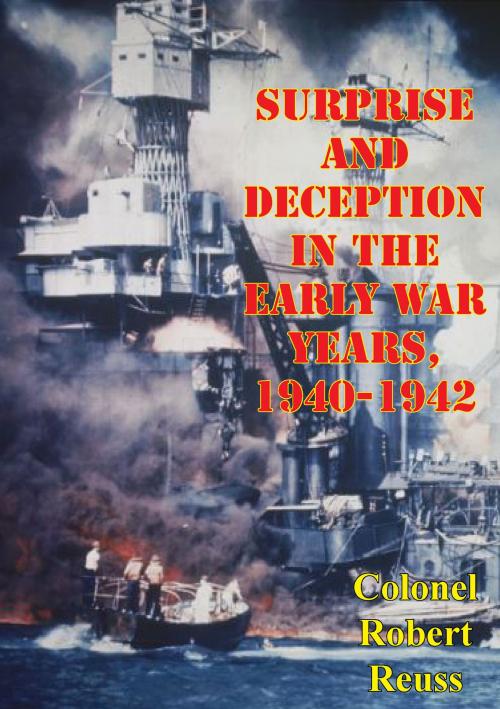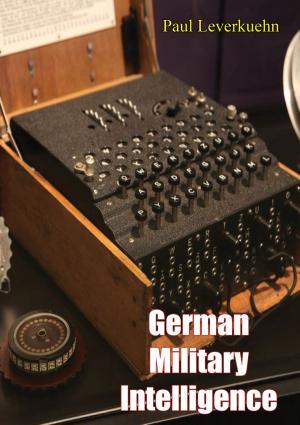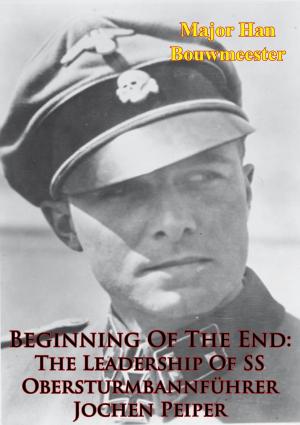Surprise And Deception In The Early War Years, 1940-1942
Nonfiction, History, Germany, European General, Military, United States| Author: | Colonel Robert Reuss | ISBN: | 9781782898153 |
| Publisher: | Lucknow Books | Publication: | August 15, 2014 |
| Imprint: | Lucknow Books | Language: | English |
| Author: | Colonel Robert Reuss |
| ISBN: | 9781782898153 |
| Publisher: | Lucknow Books |
| Publication: | August 15, 2014 |
| Imprint: | Lucknow Books |
| Language: | English |
All opening gambits in WWII were initiated by surprise (Denmark and Norway, France and the Low Countries, Russia and Pearl Harbor). The early war period provides an excellent laboratory for the study of the art of surprise and deception and offers many lessons for today's military planner. Surprise and, to a lesser degree, deception have long been recognized as elements of combat power. This study examines surprise and deception from the perspective of major military operations and campaigns with specific focus on the North Africa Campaign between 1940 and 1942. This was the first active theater of war for the Allies, and surprise and deception were frequently used by both sides. This study examines selected key battles of the North African Campaign, focusing on the achievement of surprise through deception. The scope of this effort includes the doctrinal thinking and development that occurred during the inter-war period and presents theories which show a relationship between that preparation and successes in the Campaign. The author suggests that the lessons learned from this critical period in history are relevant for contemporary military thinking.
All opening gambits in WWII were initiated by surprise (Denmark and Norway, France and the Low Countries, Russia and Pearl Harbor). The early war period provides an excellent laboratory for the study of the art of surprise and deception and offers many lessons for today's military planner. Surprise and, to a lesser degree, deception have long been recognized as elements of combat power. This study examines surprise and deception from the perspective of major military operations and campaigns with specific focus on the North Africa Campaign between 1940 and 1942. This was the first active theater of war for the Allies, and surprise and deception were frequently used by both sides. This study examines selected key battles of the North African Campaign, focusing on the achievement of surprise through deception. The scope of this effort includes the doctrinal thinking and development that occurred during the inter-war period and presents theories which show a relationship between that preparation and successes in the Campaign. The author suggests that the lessons learned from this critical period in history are relevant for contemporary military thinking.




![Cover of the book St Vith: Lion In The Way: 106th Infantry Division in World War II [Illustrated Edition] by Colonel Robert Reuss](https://www.kuoky.com/images/2014/august/300x300/9781782898559-GZaf_300x.jpg)
![Cover of the book Contemptible [Illustrated Edition] by Colonel Robert Reuss](https://www.kuoky.com/images/2015/november/300x300/9781786251114-fijE_300x.jpg)






![Cover of the book North Sea Diary. 1914-1918 [Illustrated Edition] by Colonel Robert Reuss](https://www.kuoky.com/images/2015/november/300x300/9781786255426-8mTL_300x.jpg)

![Cover of the book With Cavalry In 1915, The British Trooper In The Trench Line, Through Second Battle Of Ypres [Illustrated Edition] by Colonel Robert Reuss](https://www.kuoky.com/images/2012/april/300x300/9781782890737-IjQw_300x.jpg)
